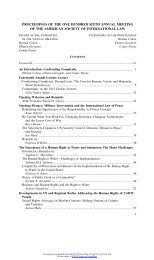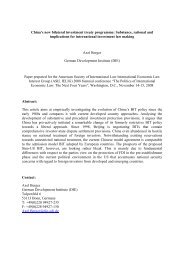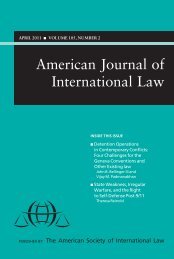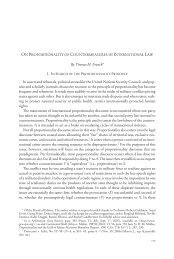westphalian system (1648) - American Society of International Law
westphalian system (1648) - American Society of International Law
westphalian system (1648) - American Society of International Law
You also want an ePaper? Increase the reach of your titles
YUMPU automatically turns print PDFs into web optimized ePapers that Google loves.
THE PILLARS<br />
• Verticality<br />
- regulatory: universally defined<br />
principles;<br />
- functional: integrated decisional<br />
processes with institutions’<br />
participation<br />
• Legality<br />
- legality principle (ex iniuria jus<br />
non oritur);<br />
- control <strong>of</strong> legality over global<br />
governance<br />
• Integration<br />
- organizational model <strong>of</strong> the<br />
world’s society based on the<br />
gradual integration between<br />
various <strong>system</strong>s <strong>of</strong> organization<br />
(legal, social, economic, religious,<br />
and mediatic) at different<br />
aggregation levels (local to<br />
worldwide)<br />
• Collective guarantees<br />
- integrated mechanisms <strong>of</strong><br />
monitoring, ascertainment, and<br />
coercive implementation measures<br />
GLOBAL LEGAL SYSTEM<br />
LEGAL SYSTEM FOR A UNIVERSAL HUMAN SOCIETY<br />
PRINCIPLES/<br />
CONCEPTS*<br />
• Global constitutional<br />
principles/values<br />
- prohibition on the use <strong>of</strong> force;<br />
safeguarding self-determination,<br />
human rights; common heritage<br />
concept; sustainable development<br />
• Multilateral Regimes<br />
- to formulate regulations, to<br />
manage, protect, and conserve<br />
environment, global commons,<br />
natural resources, cultural goods<br />
• Global Economy<br />
- WTO/GATT rules, world financial<br />
regulations<br />
• Integration concept<br />
- harmonization/ integration <strong>of</strong><br />
legal <strong>system</strong>s in the direction <strong>of</strong><br />
global law<br />
- global law is the third stage <strong>of</strong><br />
development <strong>of</strong> international law,<br />
the preceding two phases being<br />
the international law <strong>of</strong><br />
coexistence and the international<br />
law <strong>of</strong> cooperation<br />
*The emergence <strong>of</strong> rules oriented<br />
towards individuals, ethnic groups,<br />
humankind, marks the transition from<br />
inter–state society to global<br />
community<br />
• States<br />
PLAYERS<br />
• Non-state actors/global forces<br />
(IGOs, NGOs and different forms<br />
<strong>of</strong> power, ie. new powers)<br />
GLOBAL FUNCTIONS/<br />
PROCESSES*<br />
• Rule-formation<br />
- quasi–organic processes;<br />
- public participation, together<br />
with non–governmental<br />
organizations, and private sectors<br />
• Regime <strong>of</strong> compliance and<br />
enforcement<br />
- integrated <strong>system</strong>s for<br />
monitoring and action<br />
• Global judicial function<br />
- global courts and tribunals to<br />
protect global values and<br />
commons<br />
- participation <strong>of</strong> civil society in<br />
international courts and tribunals<br />
(e.g. Human Rights Courts,<br />
<strong>International</strong> Criminal Court)<br />
*Multilateral normative processes and<br />
actions for managing worldwide economic<br />
and social development as well as threats<br />
to international peace and security<br />
© Giuliana Ziccardi Capaldo, The Pillars <strong>of</strong> Global <strong>Law</strong>, Ashgate, Aldershot, 2008<br />
Table 3: Global Legal System<br />
GLOBAL GOVERNANCE*<br />
• Co-management <strong>of</strong> global<br />
values and commons<br />
• Integrated decision-making<br />
processes (institutional<br />
participation and control)<br />
• Multilateral actions and<br />
shared responsibility<br />
• Central role <strong>of</strong> UN<br />
• Judicial control over the<br />
executive<br />
*Shared governance under UN control<br />
involving the forces <strong>of</strong> the global<br />
community (UN organs, states, non-state<br />
actors, IGO, NGOs, civil society, and the<br />
private sector)







